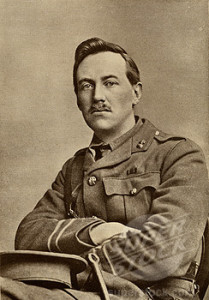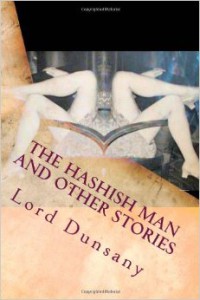Lord Dunsany Re-read: A House on Go-by Street
 Bill Ward and I are continuing with our Lord Dunsany re-read with a follow-up to one of Dunsany’s greatest, “Idle Days on the Yann.” Here’s a link to the Gutenberg edition of Tales of Three Hemispheres, one of Lord Dunsany’s later (and to my mind weaker) collections. Towards the very end of the collection are “A Shop in Go-By Street,” and “The Avenger Of Perdóndaris.” Next week we’ll be discussing “Avenger.” This week we read “Go-By Street.”
Bill Ward and I are continuing with our Lord Dunsany re-read with a follow-up to one of Dunsany’s greatest, “Idle Days on the Yann.” Here’s a link to the Gutenberg edition of Tales of Three Hemispheres, one of Lord Dunsany’s later (and to my mind weaker) collections. Towards the very end of the collection are “A Shop in Go-By Street,” and “The Avenger Of Perdóndaris.” Next week we’ll be discussing “Avenger.” This week we read “Go-By Street.”
Howard: This was the first Lord Dunsany story I’ve read where I felt tension. I thought I’d read it before, but it seemed new to me, because I honestly was waiting, breathless, to see whether the narrator could get back to the Yann. There was less distance between the reader and the events this time than I’ve felt before in a Dunsany story, perhaps because I could relate so well to the narrator’s desperate search for a way back to the land of dreams and the magic he found there. And I exulted with him when he found the way, and I enjoyed with him the delights along his path and all the marvelous little Dusnany-esque asides, like the dreams of dead poets and the sleeping gods and how forlorn Time will be when the Gods are finally dead, and the fate of those who prophesy the word of dead gods.
But then, of course, he reaches the Yann and finds what he finds and I get the message I was afraid I’d find all along — that you can’t go home again. And this left me feeling incredibly sad. It’s a valid point, and a true one, and one I feel too bitterly and strongly anymore, which is why I so wanted the narrator’s quest to succeed.
 I enjoyed the interchange with the witch and her cat at the very end, but I have to admit that I walked slump shouldered away from this one. I missed the Yann and the boat and the captain and the sailors, and was so very sad to find them gone along with so much else. I too well know how much we need to cherish what we have because tomorrow it may be gone, and I wanted Dunsany to lie to me.
I enjoyed the interchange with the witch and her cat at the very end, but I have to admit that I walked slump shouldered away from this one. I missed the Yann and the boat and the captain and the sailors, and was so very sad to find them gone along with so much else. I too well know how much we need to cherish what we have because tomorrow it may be gone, and I wanted Dunsany to lie to me.
But I think it’s a poor reviewer who judges a story on what they thought it should be about rather than whether or not it succeeded at its intent, so I’m giving it a star.
Bill: It did have more tension, I think Yann’s narrator almost feels as distant as the kind used in a framing story, and this time Dunsany is actually moving the plot, rather than drifting downstream. And I agree it was sad, it was almost a subversion of the first tale, you can’t go home again, not even in dreams, not even in illusion. The next story (I read ahead!) picks up on that as well.
Dunsany’s great theme of time comes across strongly here, for he doesn’t just wait in vain for the Bird of the River to pick him up, he actually discovers a remnant of that ship, which has rotted away long ago. We learn a bit more about the Land of Dream as well, and how it is a place of the gods that sleep, gods that “will die by the bedside of the last man.” Dunsany’s head reels as he contemplates time: “for my imagination went out into those far years and looked back at me and mocked me because I was a creature of a day.”
 The difficulty in returning to the Land of Dreams is interesting, almost as if Dunsany the author is sharing a genuine difficulty he may have had summoning such flights of the imagination though, he says, once he gave up politics “the wings of his fancy strengthened.” But he had, he admits, forgotten how to get there, and it’s only through the shop in Go-By street, a shop of impossible things, that he finds his way back. The witch he meets on the other side, with the field of flowers that are the dreams of poets, becomes more important in the next story, and she is a kind of guardian of the threshold and guide. To her, all things are illusion, dreams and life alike.
The difficulty in returning to the Land of Dreams is interesting, almost as if Dunsany the author is sharing a genuine difficulty he may have had summoning such flights of the imagination though, he says, once he gave up politics “the wings of his fancy strengthened.” But he had, he admits, forgotten how to get there, and it’s only through the shop in Go-By street, a shop of impossible things, that he finds his way back. The witch he meets on the other side, with the field of flowers that are the dreams of poets, becomes more important in the next story, and she is a kind of guardian of the threshold and guide. To her, all things are illusion, dreams and life alike.
But she is no friendly presence like the crew of the Bird, and the tension certainly gives this whole story a different feel. Unlike in “Yann,” the most perilous moment of which was the suggestion of the great beast that would destroy Perdondaris, here we have a real threat aimed straight at our narrator — the possibility of going insane. I don’t think Dunsany had ever hinted at that in any of the stories we read before, but here he must cross quickly through a forest filled with unseen beasts that rarely attack but, when they do, they rob a dreamer of his sanity (Dunsany references Hanwell Asylum — could it be that only the mad can revisit the same dream again and again, and spend all their days on the Yann?). Dunsany’s lonely vigil for the boat to appear has a different quality about it as well, for the first time he is stationary in this realm, not moving, and I felt that the wondrous landscape of the jungle became more claustrophobic and dangerous than when he was idling by in the last story.
Great name checking of all the cities and people mentioned in ‘Yann,’ and I was pleased to see a mention of Bethmoora slip in there as well. Dunsany’s style shifts a bit as well as he transitions from our world to the Land of Dream, his lush and poetic language once he enters the realm of the Yann are perhaps heightened by this story having begun in more a more mundane setting. I give it two stars — all three of these “Yann” stories are quite rich and offer plenty to think about in addition to being full of marvelous images.
Howard: That’s it for this week. I hope you’ll join us for the next Lord Dunsany story the coming Friday, and then we’ll jump into Time and the Gods.
0 Comments